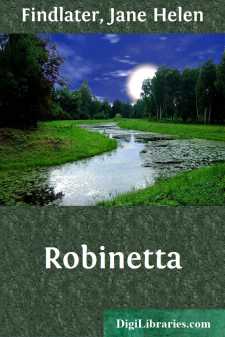Categories
- Antiques & Collectibles 13
- Architecture 36
- Art 48
- Bibles 22
- Biography & Autobiography 813
- Body, Mind & Spirit 142
- Business & Economics 28
- Children's Books 14
- Children's Fiction 11
- Computers 4
- Cooking 94
- Crafts & Hobbies 4
- Drama 346
- Education 46
- Family & Relationships 57
- Fiction 11828
- Games 19
- Gardening 17
- Health & Fitness 34
- History 1377
- House & Home 1
- Humor 147
- Juvenile Fiction 1873
- Juvenile Nonfiction 202
- Language Arts & Disciplines 88
- Law 16
- Literary Collections 686
- Literary Criticism 179
- Mathematics 13
- Medical 41
- Music 40
- Nature 179
- Non-Classifiable 1768
- Performing Arts 7
- Periodicals 1453
- Philosophy 64
- Photography 2
- Poetry 896
- Political Science 203
- Psychology 42
- Reference 154
- Religion 513
- Science 126
- Self-Help 84
- Social Science 81
- Sports & Recreation 34
- Study Aids 3
- Technology & Engineering 59
- Transportation 23
- Travel 463
- True Crime 29
Robinetta
Description:
Excerpt
THE PLUM TREE
At Wittisham several of the little houses had crept down very close to the river. Mrs. Prettyman’s cottage was just like a hive made for the habitation of some gigantic bee; its pointed roof covered with deep, close-cut thatch the colour of a donkey’s hide. There were small windows under the overhanging eaves, a pathway of irregular flat stones ran up to the doorway, and a bit of low wall divided the tiny garden from the river. The Plum Tree grew just beside the wall, so near indeed that it could look at itself on spring days when the water was like a mirror. In autumn the branches on that side of the tree were the first to be shaken, lest any of the fruit should fall down and be lost. Sometimes a village child treading cautiously on bare toes amongst the stones along the narrow margin, would pounce upon a plum with a squeal of joy, for although the village was surrounded with orchards, the fruit of Mrs. Prettyman’s tree had a flavour all its own.
The tree had been given to her by a nephew who was a gardener in a great fruit orchard in the North, and her husband had planted and tended it for years. It began life as a slender thing with two or three rods of branches, that looked as if the first wind of winter would blow it away, but before the storms came, it had begun to trust itself to the new earth, and to root itself with force and determination. There were good soil and water near it, and plenty of sunshine, and, as is the way of Nature, it set itself to do its own business at all seasons, unlike the distracted heart of man. The traffic of the river came and went; around the headland the big ships were steering in, or going out to sea; and in the village the human life went on while the Plum Tree grew high enough to look over the wall. Its stem by that time had a firm footing; next it took a charming bend to the side, and then again threw out new branches in that direction. It turned itself from the prevailing wind, throwing a new grace into its attitude, and went on growing; returning in blossom and leaves and fruit an hundredfold for all that it received from the earth and the sun.
In spring it was enchanting; at first, before the blossoms came out, with small bright leaves, and buds like pearls, heaped upon the branches; then, later, when the whole tree was white, imaged like a bride, in the looking-glass of the river. It only wanted a nightingale to sing in it by moonlight. There were no nightingales there, but the thrushes sang in the dawning, and the little birds whose voices were sweet and thin chirruped about it in crowds, while the larks, trilling out the ardour of mating time, sometimes rose from their nests in the grass and soared over its topmost branches on their skyward flight.
Spring, therefore, was its merriest time, for then every passer-by would cry, “What a beautiful tree!” or “Did ye ever see the likes of it?”
There were a few days of inevitable sadness a little later when its million petals fell and made a delicate carpet of snow on the ground....


